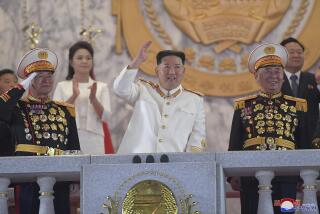Wounds Too Deep for a Simple Apology
- Share via
It has been 80 years since Japan formally annexed Korea, 45 years since defeat in World War II brought its harsh rule to an end. But older Koreans have not forgotten, and younger Koreans have been taught from birth to remember the oppression and humiliations of the colonial period, a final if unintended consequence of which was to leave Korea divided between two bitterly antagonistic states. Not until 1965 did South Korea establish full diplomatic relations with Japan. And not until this week did the Seoul government at last win from Tokyo something close to the apology it has long sought for what Koreans in the first half of this century were forced to endure.
Japan’s military takeover of the Korean peninsula in fact began as early as 1904, at the onset of the Russo-Japanese war. The colonization that followed aimed at much more than economic exploitation. It included a systematic effort to denigrate and even eradicate much of Korean culture. South Korea’s President Roh Tae Woo, addressing the Diet in Tokyo on Friday, recalled how Korean schoolchildren would be severely punished by their teachers if they were heard speaking Korean instead of Japanese, or even if they used their given Korean names rather than the Japanese names that authorities insisted they must have. Hundreds of thousands of Koreans were transported to Japan to serve as slave laborers. About 700,000 ethnic Koreans remain there today, an unassimilated minority discriminated against both socially and by law.
Japan, as recurrent controversies over the accuracy of its history textbooks show, remains reluctant to dwell on or even fully to acknowledge the aggressive policies it pursued before and during World War II. Six years ago another South Korean president sought an official expression of contrition in Tokyo. At that time, the late Emperor Hirohito would only refer to the “regrettable” and “unfortunate” past that had existed between the two countries. This week, his son, Emperor Akihito, was somewhat more forthcoming, expressing “deepest regret” for the “sufferings . . . brought about by my country.” Even stronger expressions of remorse and apology were delivered by Japanese political leaders.
Will all this, as Roh asked Japan’s Parliament, “break off the shackles of the past and clean up negative residues of what went on in bygone days”? Certainly that is the hope. But memories of the past are likely to intrude as the two countries address tough issues of the present, notably Korean complaints about unfair Japanese trading practices and about the treatment of Koreans resident in Japan. Geographically, Koreans and Japanese are close neighbors. Emotionally, the distance between them may still be considerable.
More to Read
Sign up for Essential California
The most important California stories and recommendations in your inbox every morning.
You may occasionally receive promotional content from the Los Angeles Times.













